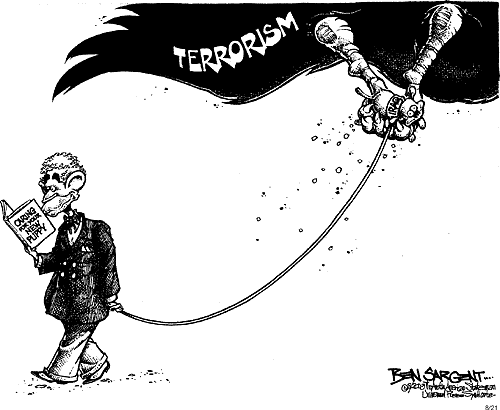This guy may teach journalism, but he knows a helluva lot more about history than most of those teaching history at SUNY-Albany. And, I like his take on those who make jokes about the inadequacies of public education (W who went to Andover and wants to leave no child behind?)
Why Are Students So Ignorant of History? (posted 8-22-03)
By Darryl McGrath, writing in the Buffalo News (August 17, 2003):
One student was unable to define either the Berlin Wall or the Soviet Union on a recent quiz. Another thought that Hiroshima was the bombing that made the United States enter World War II. A third thought the line "look away, look away" came not from the Confederate national anthem "Dixie" but from "The Star-Spangled Banner."
Almost none of the students had ever heard of the Eastern Bloc countries, and all of them struggled to list three times in the past 30 years that the United States had entered into an armed conflict. Most of them couldn't name the two presidents who saw the United States through World War II.
All of these are examples of how my students -- college juniors and seniors -- did on quizzes in the advanced journalism course I taught this summer at the University at Albany.
There were no trick questions. There was nothing on these quizzes that should have stumped anyone who has read a newspaper, a news magazine or the cover of People magazine once a week -- hey, try once a year -- for the last five years. But every semester, I get more than a few answers of the kind for which the term "doozie" was coined.
All of us have seen those real-life history essays from hell written by schoolchildren that float around on the Internet as someone's idea of a joke. You know, the ones in which fifth-graders hopelessly mangle events and misunderstand words and write something like this: "Queen Elizabeth the First was the queen of England a long time ago. She was known as the Virginian Queen because she never had any kids."
As a journalist who has written about urban school districts, I actually don't find it so cute when children become the butt of somebody's joke about the inadequacies of public education. I find it far less funny when those same children are ready to enter the working world 10 years later, and they're still at the same level of historical illiteracy.
What are we doing wrong with the way we teach history? More specifically, why do college students have so little understanding of the 20th century?
One problem might be the textbooks, suggests literacy advocate Andrew Carroll, 33, who came to his love of history after college.
"In my old high school textbook, there was a full page on the Tariff of 1816, and only a sentence on D-Day," Carroll said. "Unless you want to impress someone at a cocktail party, the Tariff of 1816 doesn't have as much significance as D-Day."
Carroll is the co-founder and executive director of the American Poetry & Literacy Project in Washington, D.C., which distributes free books of poetry in public venues such as train stations. As the editor of two collections of letters written by ordinary Americans, Carroll -- who recalls hating history in high school and college -- has discovered that there are better ways than rote memorization to make history come alive for students.
Based on his own archiving projects for his books, Carroll suggests encouraging students to devise and execute history projects of their own. Students who hate classroom lectures might come alive as they analyze documents, oversee an oral history assignment or become the curators of a classroom collection of artifacts.
I'd happily settle for my students demonstrating a grasp of the past 60 years, but the 1990s are about as far back as most can go. For many of them, Vietnam might as well be the Peloponnesian War. Other critical markers of the past century -- the civil rights movement, World War II, the Great Depression -- are fodder for a college-level version of the Queen Elizabeth essay.
Copyright © 2003 History News Network
